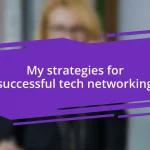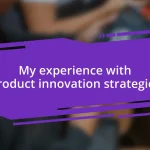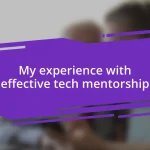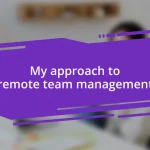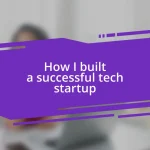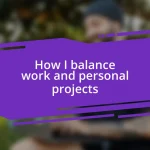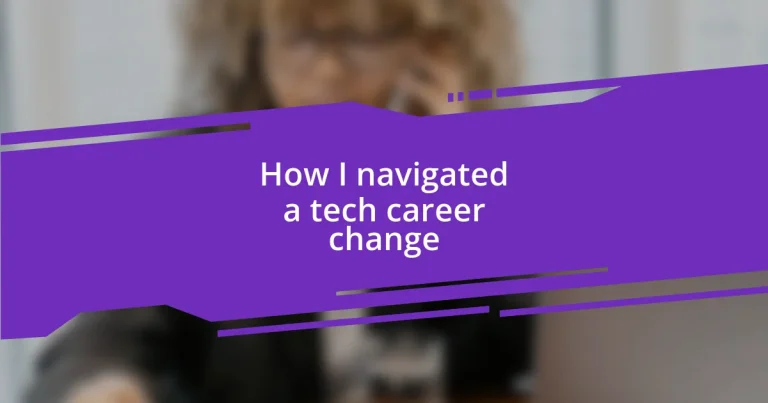Key takeaways:
- Recognize and leverage transferable skills from previous roles to enhance adaptability and confidence in new tech contexts.
- Conduct thorough research on in-demand tech roles and create a personalized learning plan aligned with career aspirations and interests.
- Engage in practical experiences, such as internships and freelancing, while preparing for interviews through mock sessions and company research to boost confidence and effectiveness.
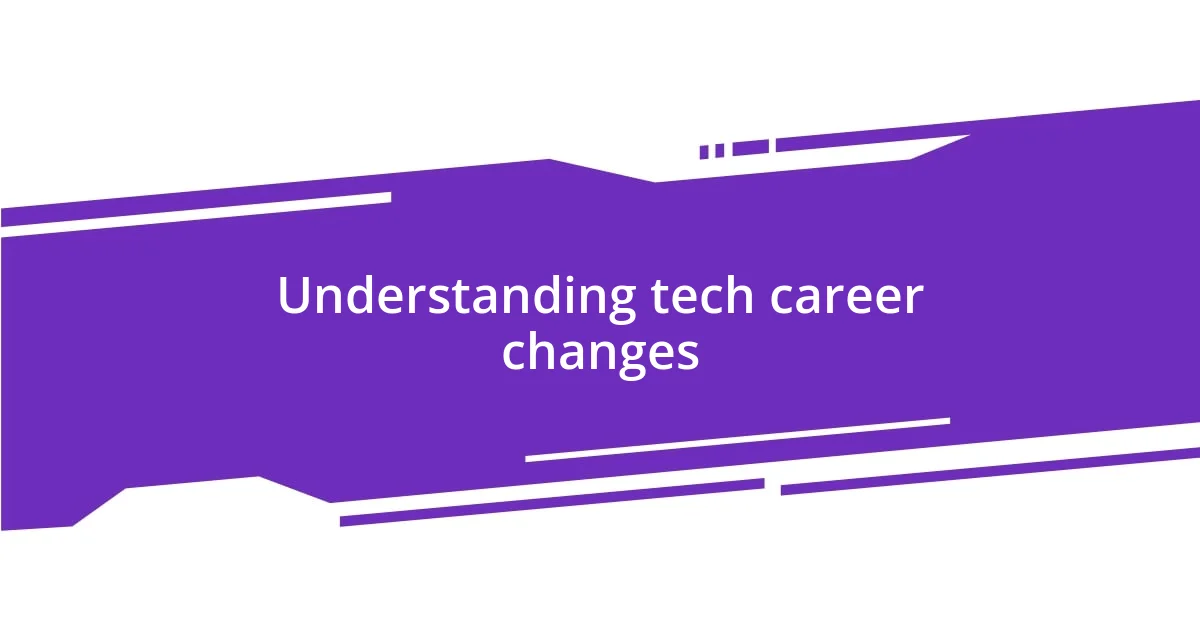
Understanding tech career changes
Navigating a tech career change can be both exhilarating and intimidating. I remember when I decided to shift from a comfortable role in project management to a more hands-on position in software development. The thrill of diving into new challenges was coupled with a wave of self-doubt that made me wonder if I was truly ready for this leap.
As I explored different paths within the tech industry, I often felt overwhelmed by the sheer number of options available. Have you ever stood at a crossroads, unsure of which way to go? I found that grounding myself in the fundamentals of what I enjoyed most—solving problems and building systems—helped clarify my direction.
On top of that, it’s crucial to recognize that a tech career change isn’t just about acquiring new technical skills; it’s also an emotional journey. When I transitioned, I experienced feelings of anxiety and excitement in equal measure. Embracing that mix can be empowering, as it fuels your desire to learn and grow.
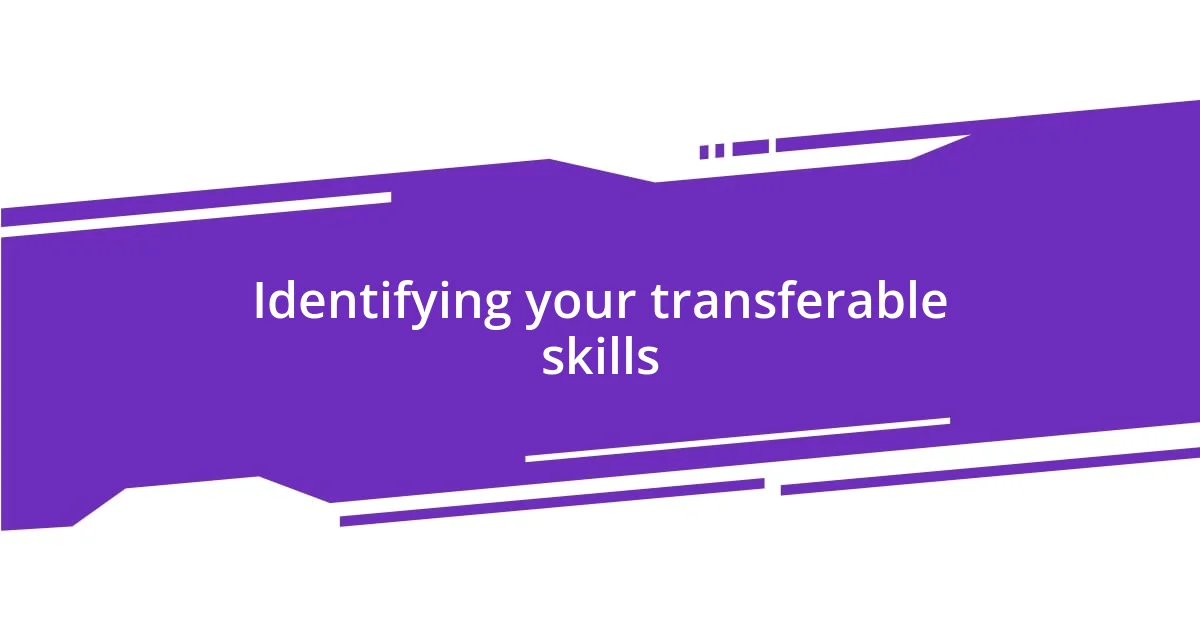
Identifying your transferable skills
Identifying your transferable skills is like uncovering hidden gems within your previous experiences. I remember when I first started my own assessment; I listed everything I did in my previous role, from leadership to communication strategies. It became clear how these skills—often taken for granted—could apply seamlessly to a tech environment.
To illustrate this, I once managed a diverse team, which taught me how to navigate different personalities and foster collaboration. This skill translated directly to tech, where teamwork and effective communication are paramount. Have you evaluated the value of your own experiences in a similar light? It’s rewarding to recognize how those foundational skills can enhance your adaptability and problem-solving prowess in new contexts.
Creating a careful inventory of your skills doesn’t just help clarify your strengths; it also builds your confidence. As I reflected on my journey, I realized that skills like critical thinking and project management equipped me to tackle complex tech issues. This realization was empowering, reinforcing the idea that my past roles weren’t just stepping stones; they were essential elements of my future success in tech.
| Previous Experience | Transferable Skill |
|---|---|
| Project Management | Leadership & Organization |
| Team Collaboration | Communication & Teamwork |
| Problem Solving | Analytical Thinking |
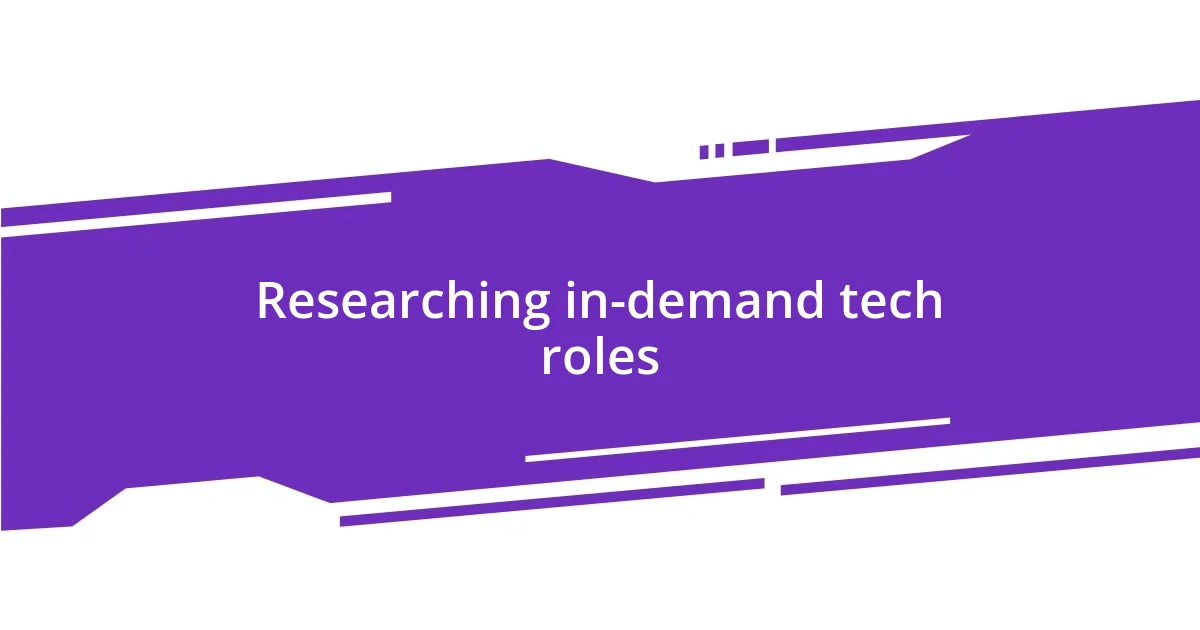
Researching in-demand tech roles
Researching in-demand tech roles is a crucial step in making a successful career shift. When I first began my journey, I hopped online and immersed myself in various resources. Websites like LinkedIn and Glassdoor were invaluable, revealing not just job titles but also the skills that employers sought. I often felt like I was piecing together a puzzle, excitedly checking off each desired skill as I learned more.
Here are a few key strategies I found helpful:
- Job Boards: Regularly browse tech job listings to identify recurring roles and required skills.
- Industry Reports: Seek out reports on emerging tech trends, focusing on roles that are gaining traction.
- Networking: Connect with professionals in your target sector to gain insights about in-demand positions.
- Online Courses: Explore platforms like Coursera and Udacity for courses aligned with in-demand skills.
- Social Media: Follow tech companies and influencers on platforms like Twitter and LinkedIn for real-time updates on shifts in the job market.
I remember feeling a mix of excitement and apprehension as I explored the vast realm of tech roles. Mapping out potential positions wasn’t just about finding a job; it brought clarity to my aspirations and helped pinpoint where I could truly thrive. As I learned about roles like data analyst and UX designer, I realized that the best choices align with not only demand but also personal passion—after all, pursuing something you love can make the journey much more fulfilling.
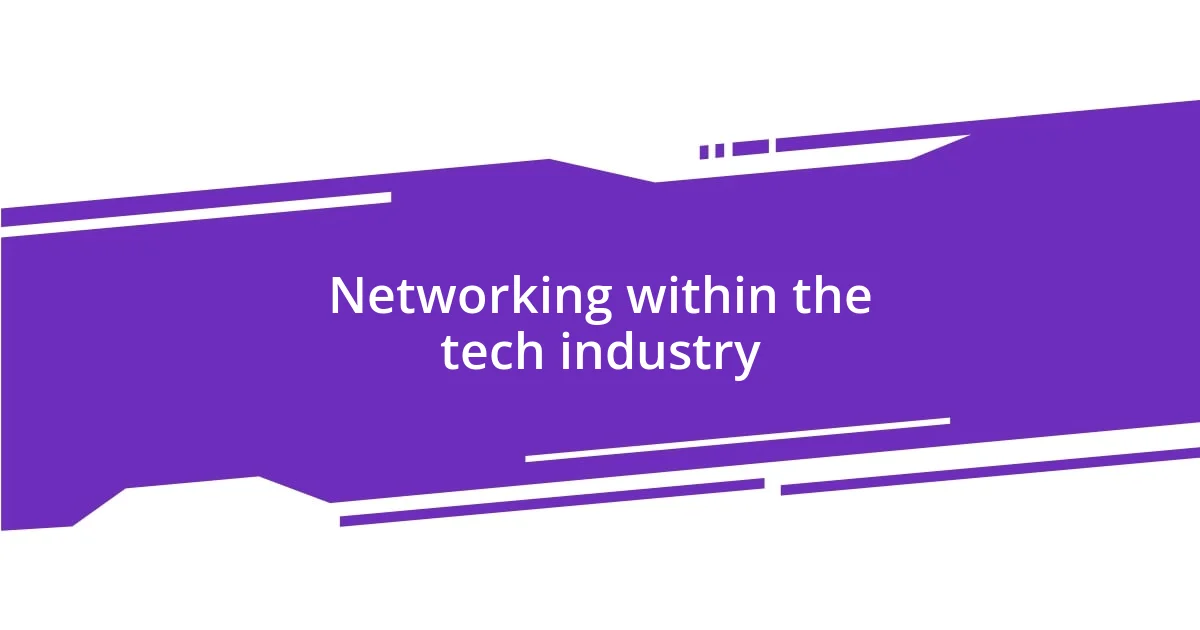
Networking within the tech industry
Building connections in the tech industry can be both exhilarating and daunting. When I transitioned into tech, I discovered that networking wasn’t just about exchanging business cards; it was about forming genuine relationships. I recall attending a local tech meetup, feeling a swirl of nerves and excitement. That night, I spoke with a software developer who shared invaluable advice about honing my skills and even introduced me to resources that jumpstarted my learning.
I learned early on that using platforms like LinkedIn could amplify my networking efforts. By joining relevant groups and actively participating in discussions, I made connections with industry professionals who generously offered their insights. Have you considered how a simple comment or post could open up new doors for you? It’s incredible how a single interaction can lead to opportunities you might not have envisioned. Networking became a two-way street, where I found not just mentors but also the chance to support others.
Moreover, attending conferences and workshops transformed my perspective on the tech community. I remember one event where I met a group of aspiring developers, each with unique backgrounds and stories. Sharing experiences ignited a sense of camaraderie, reminding me that we’re all navigating similar paths in this constantly evolving landscape. While it can be tempting to view networking as transactional, I realized it’s much more about sharing knowledge, learning from one another, and fostering a supportive community.
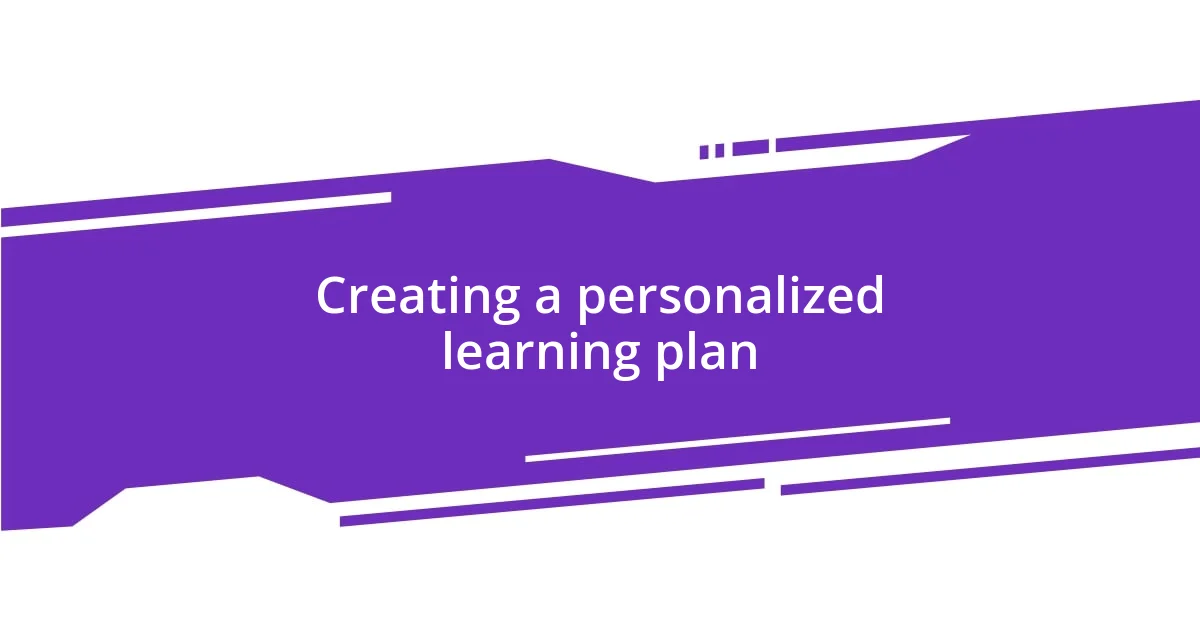
Creating a personalized learning plan
Creating a personalized learning plan is essential for anyone serious about navigating a tech career change. I remember sitting at my kitchen table, armed with a notebook and a list of skills I wanted to acquire. The process felt overwhelming initially. What should I focus on first? To tackle this, I broke my learning goals into smaller, manageable chunks. Each week, I’d choose one new skill or concept—like mastering Python basics or diving into web design—and dedicate time to it. This made the journey less daunting and kept my motivation high.
As I progressed, I learned that it’s critical to align my learning with my career aspirations. I often asked myself, “What roles excite me the most?” This reflection helped me choose online courses that matched not just current demands but my personal interests as well. For instance, I was drawn to data analysis, so I sought specific projects that would allow me to apply what I learned. I found that hands-on practice was invaluable; it reinforced my understanding and made the skills feel much more tangible.
It’s also worth mentioning the importance of incorporating diverse learning resources into my plan. While online courses provided a solid foundation, I was pleasantly surprised by how much I could learn from podcasts and tech blogs. I remember listening to a podcast on machine learning during my commute, and it deepened my understanding in ways textbooks couldn’t. Have you ever felt like one format just clicks for you? Mixing it up kept things fresh and aligned with my busy lifestyle, ensuring I stayed engaged throughout my learning journey.
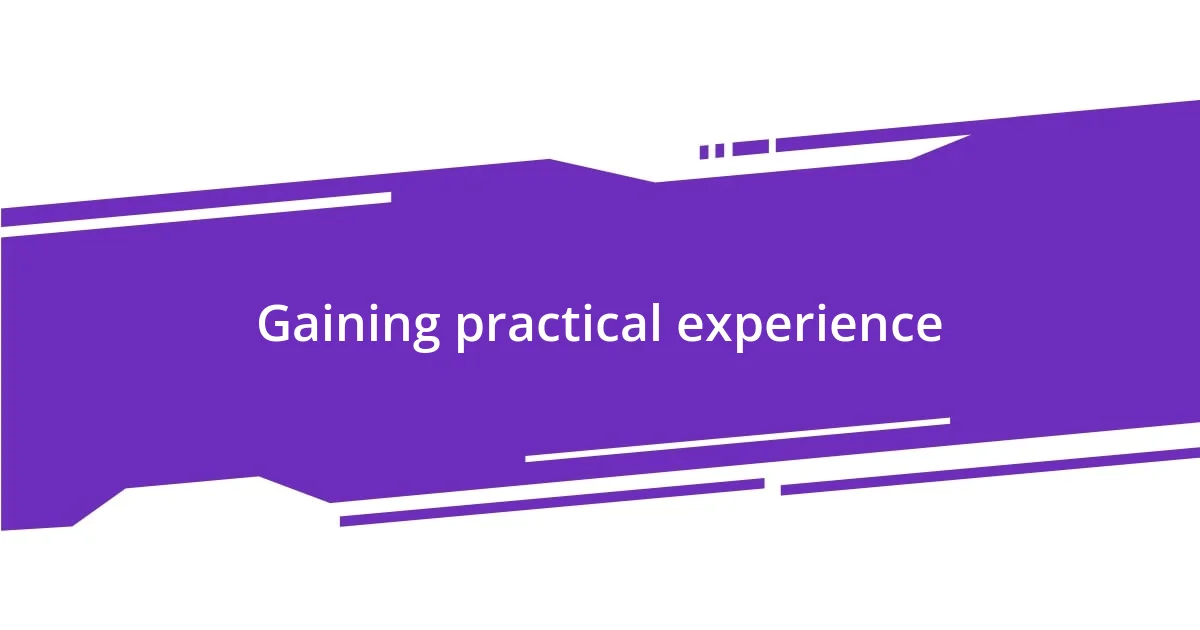
Gaining practical experience
Gaining practical experience in tech is more than just a box to check; it’s often where the magic happens. I vividly recall my first internship at a small startup. I was nervous stepping into the office, but that environment was buzzing with creativity and innovation. Each day felt like an adventure as I got my hands dirty, experimenting with code and learning to troubleshoot real-time issues. I can honestly say, nothing could replicate the thrill of applying my knowledge in such a dynamic setting.
I also took on freelance projects to diversify my experience. I remember landing a gig designing a website for a local non-profit. It was fulfilling to contribute my skills to a meaningful cause while building my portfolio. The feedback from the non-profit team was invaluable and reminded me that practical experience not only sharpens your technical skills but also teaches you how to collaborate effectively with clients. Have you thought about how real-world projects can enhance your understanding of theory? It can truly shift your perspective.
Finally, I can’t stress enough the value of seeking mentorship through practical experiences. I sought out a mentor from the local tech community, and his guidance was instrumental. We worked on projects together, and he helped me navigate complex concepts that textbooks often gloss over. It’s a transformative experience to have someone in the industry share their insights. Remember, practical experience isn’t just about building a resume; it’s about building confidence and connections that last a lifetime.
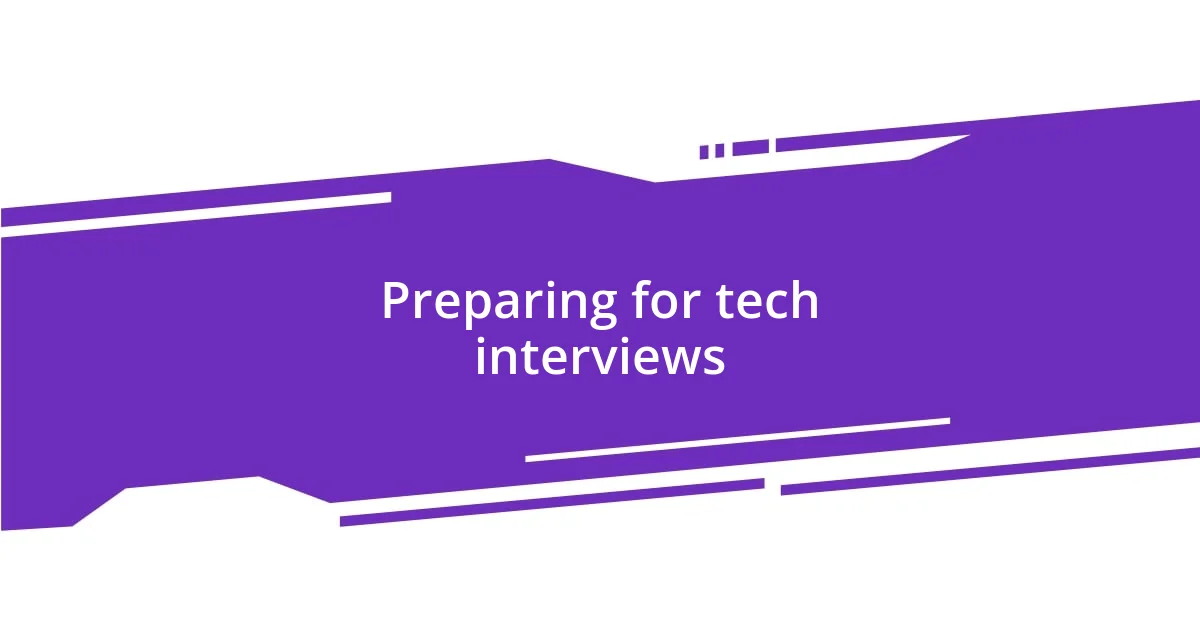
Preparing for tech interviews
Preparing for tech interviews is a critical step in transitioning to a new career, and my own experience taught me a lot about this process. I distinctly remember my initial interviews; the mix of excitement and nerves was palpable. To ease my anxiety, I began to conduct mock interviews with friends. Their feedback was invaluable and gave me the chance to refine my responses and improve my body language. Have you ever considered how much practice can impact your confidence?
I also found it beneficial to deeply research the companies I was applying to. This wasn’t merely about knowing their latest projects; it was about understanding their culture and values. For instance, during my interviews at a tech company known for its collaborative environment, I highlighted my team-based projects, hoping to resonate with their ethos. It made a significant difference. It’s funny how personal stories can connect with interviewers—like sharing my experiences during collaborative projects, sometimes it felt like I was having a genuine conversation rather than a formal interview.
Finally, I realized that technical interviews weren’t just tests—they were opportunities to demonstrate problem-solving skills and critical thinking. I often practiced coding challenges on platforms like LeetCode while timing myself to simulate actual interview conditions. Those moments of pressure were daunting, but they ultimately prepared me to think on my feet. Reflecting on it now, I realize that embracing those challenges turned my fears into a toolkit for success. Have you thought about how overcoming discomfort can lead to growth? It’s all part of the journey.
